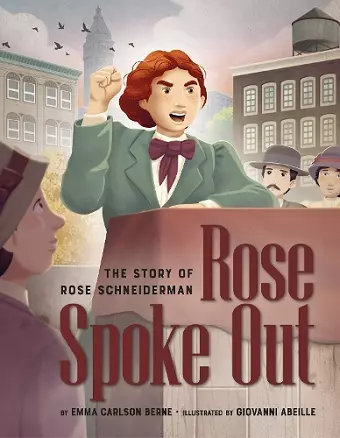Rose Schneiderman bio (TBD)
Emma Carlson Berne author Giovanni Abeille illustrator
Format:Hardback
Publisher:Behrman House Inc.,U.S.
Published:20th Apr '23
Should be back in stock very soon

"An inspiring portrait of a woman committed to making a difference and whose influence is still felt to this day." --Kirkus Reviews
A young Jewish immigrant from Poland, Rose Schneiderman went to work in a cap factory in New York City when she was just thirteen years old.
She saw that women workers earned much less than men, that the factory was cold and dirty, without even clean water for the workers to drink. Rose spoke up for better conditions, and organized 20,000 women to walk out, leaving factories all over the city empty and still. Following the Triangle Shirtwaist Factory fire in 1911, Rose's speech at the Metropolitan Opera House galvanized support for better working conditions. The International Ladies Garment Workers Union was born.
Includes historical photos and bibliography, plus a note to families about tikkun olam, repairing the world, a core element of Jewish tradition.
One powerful voice can effect powerful change.
Polish Jewish immigrant Rose Schneiderman was 8 when she arrived in New York City with her parents in the late 19th century. Even as a child, she loved talking and arguing about ideas. At age 13, she left school to help support her family, finding employment in a hat factory. In early-20th-century New York, this meant buying her own sewing machine and enduring long hours in dirty, unsafe, and unfair working conditions. Having kept silent for fear of losing her much-needed job, Rose finally spoke up upon learning women earned less than men; organizing female co-workers to protest as a group was key, and some conditions improved, including wage increases. This victory of sorts eventually led to others. In 1909, Rose led a massive strike for factory workers’ rights. As time went on, more employees, employers, then journalists and politicians heeded this woman of small stature (only 4-foot-9) and big voice, and factory conditions continued to improve, particularly after her rousing address at New York’s Metropolitan Opera House. This is a quiet, respectful, stirring look at a courageous workers’ rights champion, written in straightforward, accessible prose. The simple illustrations are cast mostly in brown shades, reflecting the somberness of poverty and dire labor practices. (This book was reviewed digitally.)An inspiring portrait of a woman committed to making a difference and whose influence is still felt to this day. (more about Rose Schneiderman, author's note) (Picture-book biography. 5-8) b--Kirkus ReviewsA diminutive red-headed immigrant to the United States who began working full-time when she was thirteen years old: Rose Schneiderman may seem an unlikely heroine or someone destined to improve the lives of her fellow workers, but Rose certainly didn’t know that. Nor did she anticipate that the sweatshop that employed her and many other women would be freezing in the winter, sweltering in the summer, and filthy all the time. Sanitation was not a priority — rats were everywhere — and danger was a constant. Rose also noticed that women were routinely paid less than men. Her determination to improve conditions for all workers led this young visionary on a path toward a remarkable career.The International Ladies Garment Workers Union, which helps employees receive benefits and equitable treatment, is one result of Rose’s activism. She is a role model for today’s young people.Although Rose Spoke Out is a picture book aimed at kids who are five through eight, older children and adults will find the story fascinating, too. The art evokes the era, enhancing the reader’s overall experience. The book concludes with historical photographs and a note about tikkun olam, or making the world a better place. --The Jewish Book Council
ISBN: 9781681156170
Dimensions: unknown
Weight: unknown
32 pages